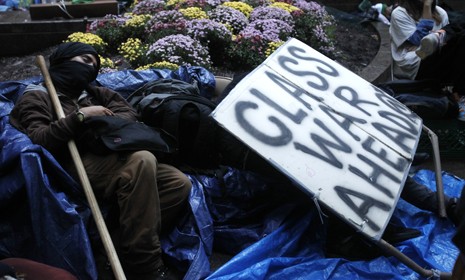The 'fatal weakness' of Occupy Wall Street
Treating Wall Street as an abstract symbol of evil has helped the protests gain traction, writes Conor Friedersdorf at The Atlantic, but it obscures the real problems

A free daily email with the biggest news stories of the day – and the best features from TheWeek.com
You are now subscribed
Your newsletter sign-up was successful
Occupy Wall Street's "chants aren't aimed at Goldman Sachs and its board, or junior executives who commute in from Connecticut, so much as the average American's idea of Wall Street [as an abstraction of evil]," writes Conor Friedersdorf at The Atlantic. That symbolic treatment "gives the protesters and their movement the bulk of its strength — and it is, at the same time, the movement's fatal weakness." It incites passionate support by tapping into familiar narratives about the rich versus the poor and middle class, but it does little to get at the root of the problems of "actual Wall Street" and the derivatives of mortgage backed securities that got us into this mess. Here, an excerpt:
What I wonder is how many of the protesters realize that the case against symbolic Wall Street is actually much weaker than the one against actual Wall Street. Symbolic Wall Street is the financial center of earth's most prosperous country. Actual Wall Street's most powerful firms bear responsibility for the most serious economic downturn since the Great Depression. At times, actual Wall Street violated the law. It squandered many billions of dollars, inflating the market for mortgage backed securities that the people in charge didn't even understand. Taxpayer money was subsequently redistributed to these firms. That is a powerful case that reform is needed.
There is, however, a robust market in America for ideological thinking, for turning every matter into an epic battle in the war between right and left, red and blue, "the 53 percent" and "the 99 percent." Doing so swells the profits of Fox News and the email lists of Occupy Wall Street organizers and their allies, among many others. They're all in theoretically defensible businesses; but perverse incentives are at play, and we ought to insist, regularly, that we won't go along.
The Week
Escape your echo chamber. Get the facts behind the news, plus analysis from multiple perspectives.

Sign up for The Week's Free Newsletters
From our morning news briefing to a weekly Good News Newsletter, get the best of The Week delivered directly to your inbox.
From our morning news briefing to a weekly Good News Newsletter, get the best of The Week delivered directly to your inbox.
Read the whole story in The Atlantic.
A free daily email with the biggest news stories of the day – and the best features from TheWeek.com
-
 The environmental cost of GLP-1s
The environmental cost of GLP-1sThe explainer Producing the drugs is a dirty process
-
 Greenland’s capital becomes ground zero for the country’s diplomatic straits
Greenland’s capital becomes ground zero for the country’s diplomatic straitsIN THE SPOTLIGHT A flurry of new consular activity in Nuuk shows how important Greenland has become to Europeans’ anxiety about American imperialism
-
 ‘This is something that happens all too often’
‘This is something that happens all too often’Instant Opinion Opinion, comment and editorials of the day
-
 The billionaires’ wealth tax: a catastrophe for California?
The billionaires’ wealth tax: a catastrophe for California?Talking Point Peter Thiel and Larry Page preparing to change state residency
-
 Bari Weiss’ ‘60 Minutes’ scandal is about more than one report
Bari Weiss’ ‘60 Minutes’ scandal is about more than one reportIN THE SPOTLIGHT By blocking an approved segment on a controversial prison holding US deportees in El Salvador, the editor-in-chief of CBS News has become the main story
-
 Has Zohran Mamdani shown the Democrats how to win again?
Has Zohran Mamdani shown the Democrats how to win again?Today’s Big Question New York City mayoral election touted as victory for left-wing populists but moderate centrist wins elsewhere present more complex path for Democratic Party
-
 Millions turn out for anti-Trump ‘No Kings’ rallies
Millions turn out for anti-Trump ‘No Kings’ ralliesSpeed Read An estimated 7 million people participated, 2 million more than at the first ‘No Kings’ protest in June
-
 Ghislaine Maxwell: angling for a Trump pardon
Ghislaine Maxwell: angling for a Trump pardonTalking Point Convicted sex trafficker's testimony could shed new light on president's links to Jeffrey Epstein
-
 The last words and final moments of 40 presidents
The last words and final moments of 40 presidentsThe Explainer Some are eloquent quotes worthy of the holders of the highest office in the nation, and others... aren't
-
 The JFK files: the truth at last?
The JFK files: the truth at last?In The Spotlight More than 64,000 previously classified documents relating the 1963 assassination of John F. Kennedy have been released by the Trump administration
-
 'Seriously, not literally': how should the world take Donald Trump?
'Seriously, not literally': how should the world take Donald Trump?Today's big question White House rhetoric and reality look likely to become increasingly blurred